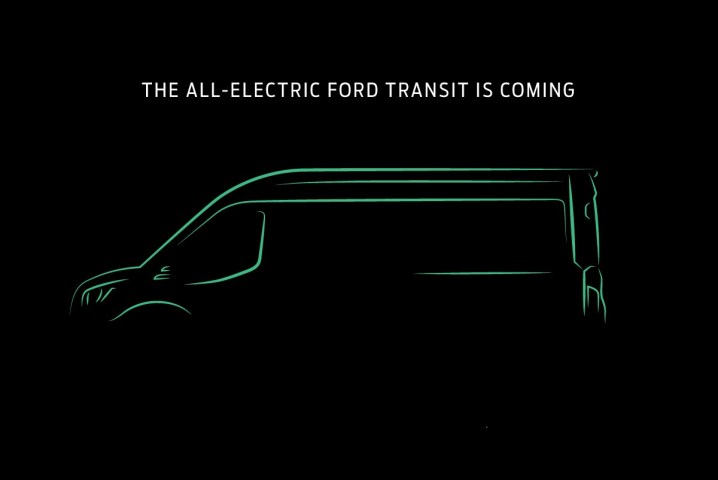
Ford is preparing to electrify an often-overlooked segment of the automotive industry. The company announced it’s developing an electric version of the Transit van, which is available in cargo- and people-hauling configurations, to give motorists who want — or need — to live their best van life a zero-emissions option.
Technical specifications about the battery-powered Transit remain vague. Ford hasn’t revealed precisely what it will be powered by, how much driving range it will offer, or whether the battery pack will compromise its cargo capacity. It pledged to offer the van in several different configurations, including a standard cargo van, a cutaway that could theoretically become an RV, and a cab-chassis well-suited to morphing into a moving truck. Buyers will have three roof heights and three body lengths to choose from, which is what’s already offered on the V6-powered Transit.
The dark preview image (shown above) published by Ford suggests the electric Transit will be an evolution of the current-generation model introduced in 2013, not an entirely new model. It’s reasonable to assume several powertrain-specific styling cues will help the zero-emissions model stand out from non-electrified versions.
Fleet operators will be able to track their vans using the Ford Telematics software, which provides access to real-time GPS data and vehicle-related diagnostic information. They’ll also have the option of geofencing the Transit to ensure drivers don’t end up at the local Ikea instead of delivering parcels. These features are made possible by the FordPass Connect modem, which also provides a 4G LTE Wi-Fi hotspot capable of powering up 10 devices at a time.
The electric Ford Transit will go on sale in the United States for the 2022 model year, meaning it will likely arrive in showrooms before the end of 2021. Pricing information hasn’t been announced yet. For context, the gasoline-burning Transit carries a base price of $34,510. Production will take place in the United States.
When it arrives, it will share showroom space with the electric version of the next F-150 and the Mustang Mach-E introduced in 2019. Ford is investing $11.5 billion through 2022 into developing electrified technology, so other battery-powered models will follow. Meanwhile, the company’s upmarket Lincoln division is working with Rivian to build a luxurious electric SUV to the market by 2022, which is seemingly a key date for the firm.



